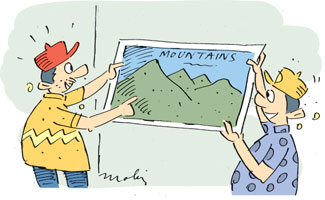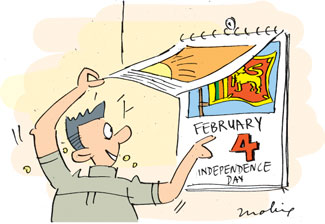|

by R. S. Karunaratne
Future perfect continuous tense
We form the future perfect continuous or the future perfect
progressive tense with ďshall / will + have been + present participle of
the verbĒ for the first person singular ( I ) and the first person
plural ( we). We use ďwill + have been + present participle of the verbĒ
for the second person singular and plural (you ) and the third person
singular (he, she, it) and the third person plural (they). Like the
future perfect tense, it is normally used with a time expression
beginning with ďbyĒ.
By February 4 Sri Lanka will have been enjoying Independence for 64
years.
|

By the end of this month we will have climbed four mountains. |
By the end of this year the principal will have been acting in his post
for three years.
By the end of this term the students will have been studying for three
months.
By the end of this week I will have been living in this room for six
days.
By the end of 2015 my father will have been working in this factory for
30 years.
By the end of this year Nalan will have been training drivers for ten
years.
By the end of this month we will have been climbing mountains for three
years.
If we wish to mention the number of students studying or the number
of people taking part in an activity, we have to use the future perfect
tense instead of the future perfect continuous tense.
By the end of this year he will have trained 50 drivers.
By the end of this month we will have climbed four mountains.
The future perfect continuous tense indicates that an event will be
in progress at a particular time in the future. It additionally
highlights the duration of the event.
By 3 p.m. the board members will have been meeting for almost two
hours.
By next year she will have been teaching at the school for four
years.
|

By February 4 Sri Lanka will have been enjoying Independence for
64 years. |
[Activity]
Complete the following sentences using the correct form of the verb
given in brackets. Check your answers with the key.
1. By this time tomorrow he ............................. to
Australia. (fly)
2. By next year we ............................ here for five years.
(study)
3. By the end of this month they ........ in this house for 30 years.
(live)
4. By the end of this month Rukmani .....................for 15 years.
(act)
5. By next week she .....................the novel for three months.
(write)
6. By 2013 he ..........................his retirement for 10 years.
(enjoy)
7. By 2030 they .............................in England for 20 years.
(live)
8.By the end of this week I .........my project report for six days.
(write)
9.By the end of December I ........................for 40 years. (work)
10.By January 2013 we ..........Information Technology for one year.
(learn)
Key:
1. will have been flying
2. will have been studying
3. will have been living
4. will have been acting
5. will have been writing
6. will have been enjoying
7. will have been living
8. will have been writing
9. will have been working
10. will have been learning

In order to be a fluent speaker or an effective writer, you will have
to enrich your vocabulary.
Here is an interesting quiz to test your vocabulary. Indicate the
correct answer for each word in bold type in the following sentences and
check your answers with the key.
1. The priest used a crucifix and a Bible to exorcise the evil
spirit.
(a) to drive away
(b) to solicit
(c) to invite
2. The police inspector surprised the murder suspect with his
inscrutable expression.
(a) lively
(b) mysterious
(c) jovial
3. If you stay indoors for a very long time, you will develop an
unhealthy pallor.
(a) symptoms
(b) disease
(c) unnatural paleness
4. If you are interested in unidentified flying objects, study
phenomenology.
(a) science of planets
(b) science of unusual happenings
(c) science of aliens
5. The polygraph will tell us whether a person is lying or not.
(a) lie detector
(b) judge
(c) courts
6. Donít purloin your own valuables to claim compensation from the
insurance company.
(a) sell
(b) deposit
(c) steal
7. Some people do not like religious rituals.
(a) a system of rites
(b) beliefs
(c) writings
8. The soothsayer warned the minister not to attend the senate
meeting.
(a) one who is loyal
(b) one who predicts the future
(c) one who is corrupt
9. The amplitude of the professorís knowledge is amazing.
(a) fullness
(b) emptiness
(c) poverty
10. Messages are carried to the brain through the infinitesimal
vessels of the nervous system.
(a) unseen
(b) too small to be measured
(c) large
Key:
1. (a) 2. (b) 3. (c) 4. (b) 5. (a) 6. (c) 7. (a) 8. (b) 9. (a) 10.
(b)
Starters:
Common expressions in speech
We use Ďtooí and Ďeitherí at the end of a sentence mostly in speech.
Use Ďtooí after a positive verb.
A: Iím delighted.
B: Iím delighted too.
A: I enjoyed the novel.
B: I enjoyed it too.
A: Mary is a journalist.
B: Her husband is a journalist too.
A: It rained on Monday.
B: It rained on Tuesday too.
A: Cyrilís son is a lawyer.
B: His daughter is a lawyer too.
Use Ďeitherí after a negative verb.
A: Iím not happy.
B: Iím not happy either.
A: I canít drive.
B: I canít either.
A: Joe doesnít read newspapers.
B: He doesnít watch television either.
A: Jane canít swim.
B: She canít play tennis either.
A: I donít drink milk.
B: I donít drink it either.
Letís learn how to use ĎSo am Ií, ĎSo do Ií, ĎSo have Ií etc.
A: Iím hungry.
B: So am I.
A: I went to school late yesterday.
B: So did I.
A: Iíve been to India.
B: So have I.
A: I want to learn French.
B: So do I.
A: Iíll be coming late tomorrow.
B: So will I.
A: I was shocked to hear the news.
B: So was I.
A: I havenít got any money.
B: Neither have I.
A: Shilpa canít swim.
B: Neither can her sister.
A: I canít ride a scooter.
B: Neither can I.
A: I didnít buy a ticket.
B: Neither did I.
A: Iím not going to school tomorrow.
B: Neither am I.
A: I donít know anybody at the Passport Office.
B: Neither do I.
A: I never tell lies.
B: Neither do I.
[Activity]
Fill in the blanks with ďSo ........Ií or ĎNeither .............. Ií
and check your answers with the key.
1. Iím learning Tamil.
....................................................
2. I can drive a car.
....................................................
3. Iím not hungry. ....................................................
4. I like music. ....................................................
5. I donít like ice-cream.
................................................
6. I danced well last night.
...............................................
7. I have never been to Taj Mahal.
........................................
8. I donít go to the gym
everyday........................................
9. Iím leaving for Nuwara Eliya tomorrow.
................................
10. I havenít got a toothbrush.
..........................................
Key:
1. So am I. 2. So can I. 3. Neither am I. 4. So do I. 5. Neither do
I. 6. So did I. 7. Neither have I. 8. Neither do I. 9. So am I. 10.
Neither have I.
Differences between Ďmakeí and Ďdoí
ĎMakeí and Ďdoí are two verbs that give problems to many learners of
English. ĎMakeí is to produce something and Ďdoí is about performing an
action.
[Make ]
People are making arrangements for the forthcoming New Year festival.
The new director will make some changes to streamline the services.
Sometimes we have to make a choice between two courses of action.
The newly appointed leader of the ABC party refused to make any comments
on his success.
The visiting professor made a useful contribution to educational
reforms.
Many people are not willing to make a decision in an emergency.
If you make an effort , you will pass the examination.
She made an excuse and did not join the party.
Some people are good at making friends.
Colour washing has made an improvement to the old building.
If you make a mistake, admit it.
I want to make a phone call before leaving office.
Is your son making progress with his studies?
[Do ]
Do your best in the examination.
Tsunami did some damage to my house.
The scientist is doing an experiment in the laboratory.
Do more exercises if you want to remember grammatical rules.
Can you do me a favour?
He will not do any harm to your plants.
How long will you take to do my hair? I have to do my homework before
going to bed.
Mother agreed to do the washing while I do the ironing .
Do some work without idling!
One word for many
Hereís an interesting word game. Look at the following group of words
and give one word for each. To facilitate your task we have given the
first letter of the single word. Check your answers with the key.
1. Objects, materials or processes that do not occur naturally and
are created by human beings: A .......................
2. A large group of people who meet regularly to make decisions or
laws: A ..............................
3. Something or somebody considered useful for success:
A.........................
4. A piece of work given to you as part of your job or studies: A
..........................
5. Something considered true without any real proof: A
...........................
6. The scientific study of the stars and planets in space: A
.........................
7. A document or file added to another document or an E-mail:
A........................
8. An organised group of people who deal with something officially: B
....................
9. An important development or achievement: B
.........................
10. A programme, performance or speech on the radio or on television:
B ..................
11. Rules and procedures followed by government departments: B
.............................
12. An area of land that contains the main buildings of a university:
C ........................
13. An economic and political system in which property, business and
industry are owned by private individuals and not by the state: C
....................................
14. The smallest part of an animal or plant that is able to function
independently: C .....................
15. Division of people in a society into groups according to their
social status: C ..............
Key:
1. Artificial 2. Assembly 3. Asset 4. Assignment 5. Assumption 6.
Astronomy 7. Attachment 8. Body 9. Breakthrough 10. Broadcast 11.
Bureaucracy 12. Campus 13. Capitalism 14. Cell 15. Class |

